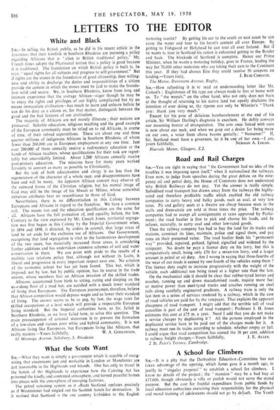Road and Rail Charges
SIR,—You are right in saying• that " the Government had no idea of the troubles it was imposing upon itself," when it nationalised the railways.
Even now, to judge from speeches during the great debate on the nine- penny oil and petrol duty, the House of Commons does not understand why British Railways do not pay. Yet the answer is really simple.
Subsidised road transport has drawn away from the railways the highly- rated and therefore profitable traffic which enabled the old railway companies to carry heavy and bulky goods, such as coal, at very' low rates. Pit and gallery seats at a theatre are cheap because seats in the stalls and dress-circle are sold at three times the price. The railway companies had to accept all consignments at rates approved by Parlia- ment ; the road haulier is free to pick and choose his loads, and he refuses, naturally, to carry coal and other low-rated goods.
Then the railway company has had to buy the land for its tracks and stations, construct its lines, maintain, police and signal them, and pay rates on their presumed value. The road haulier finds his " permanent way" provided, repaired, policed, lighted, signalled and widened by the ratepayer. No doubt he pays a licence duty on his lorry, but this is comparatively small, being only £70 for a seven-ton lorry, and a larger amount in petrol or oil duty. Am I wrong in saying that three-fourths of the wear of our roads is caused by one-fourth of the vehicles using them ? The licence duty ought to increase progressively with the weight of the vehicle, each additional ton being taxed at a higher rate than the last.
On the mechanical side it should be clear that rubber-tyred lorries and coaches, running up and down macadamised roads, require more fuel or motive power than steel-tyred trucks and coaches running on steel rails along carefully engineered gradients. A railway train is only the last item in a series of services rendered by a railway, which in the case of road vehicles are paid for by the ratepayer. That explains the apparent cheapness of road transport. I might add that the terrible toll of road casualties is part of the cost of road transport ; Professor J. H. Jones estimates this cost at £75 m. a year. Need I add that you do not make a service cheaper by duplicating it ? All the persons employed in the duplicated service have to be paid out of the charges made for it. A railway must run its trains according to schedule, whether empty or full. I could argue that road competition has caused the 16 per cent. addition to railway freight charges.—Yours faithfully, J. E. ALLEN. 2 St. Peter's Terrace, Cambridge.










































 Previous page
Previous page